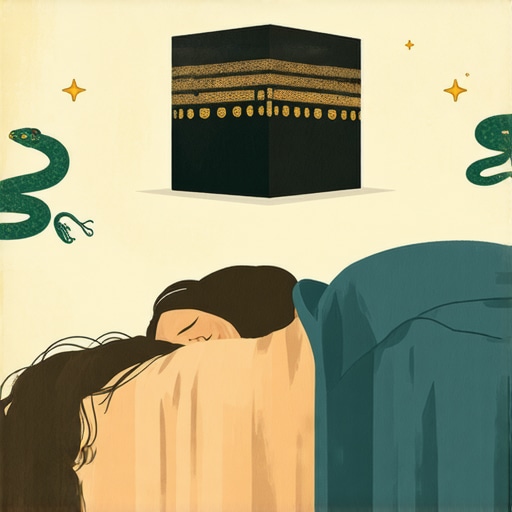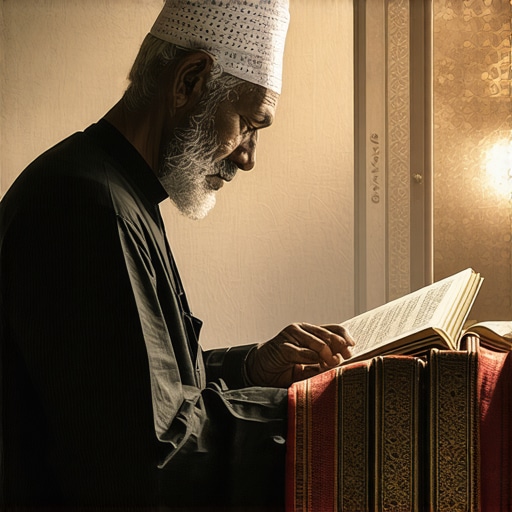My Personal Journey into Dream Interpretation and Its Sacred Roots
Ever since I was young, I have been fascinated by the profound power of dreams and their connection to divine guidance. My curiosity grew when I experienced a vivid dream that I later learned was linked to the teachings of Prophet Muhammad. This personal experience sparked my journey into understanding the sacred art of Prophet Muhammad dream interpretation in Islam. Over time, I realized that dreams are not just nighttime illusions but carry messages from the divine, as emphasized in Islamic teachings.
Understanding the Sacred Symbols in Prophet Muhammad’s Dreams
In my quest, I discovered that Prophet Muhammad’s dreams often contain symbols that are rich with meaning. For example, dreaming of the Kaaba signifies divine guidance and closeness to Allah. Interpreting these symbols requires deep knowledge, which is rooted in authentic sources like the Ibn Sirin’s dream dictionary. I’ve learned that dreams involving animals, such as camels or snakes, reveal spiritual journeys or warnings, aligning with Islamic interpretations.
How Can Dream Interpretation Impact Our Spiritual Lives?
Reflecting on my experiences, I realize that understanding Prophet Muhammad’s dreams can serve as a means for spiritual purification and divine connection. When I interpret dreams correctly, I feel more aligned with my faith and better equipped to face life’s challenges. As Prophet Muhammad himself emphasized the importance of sincere dreams in guiding believers, I find that embracing this knowledge enriches my spiritual practice. For those seeking guidance, exploring reputable sources like the Islamic Dream Interpretation Guide can be enlightening.
What Are the Key Signs That a Dream Is Divinely Inspired?
Many wonder how to differentiate between ordinary dreams and divine messages. Based on my understanding, dreams that are clear, peaceful, and leave a lasting impression often hold sacred significance. Additionally, dreams that align with Islamic teachings and prophetic symbols tend to be divine in origin. Recognizing these signs requires a sincere heart and knowledge, which can be cultivated through studying authentic Islamic sources.
If you’re interested in exploring your dreams and understanding their divine messages, I encourage you to share your experiences or ask questions in the comments below. Connecting with others on this spiritual journey can deepen our understanding and faith.
Remember, in Islam, dreams are a valuable window into the unseen, and Prophet Muhammad’s teachings guide us to interpret them with wisdom and trust in Allah’s wisdom.
Deciphering the Sacred Language of Dreams in Islamic Tradition
Dreams have always been regarded as divine communications in Islam, serving as a sacred language that transcends ordinary perception. As an expert in Islamic dream interpretation, I emphasize that understanding these messages requires a nuanced approach rooted in authentic sources. The Prophet Muhammad himself highlighted the significance of sincere dreams, which can carry guidance, warnings, or glad tidings from Allah.
The Power of Symbols: Recognizing Divine Guidance in Dreams
Islamic dream symbolism is rich and layered. For example, dreaming of the Kaaba often signifies divine closeness and spiritual elevation. Similarly, visions involving animals such as camels or snakes can symbolize spiritual journeys or warnings, respectively, as detailed in the Islamic Dream Dictionary. Recognizing these symbols accurately can deepen your connection with divine guidance and enhance your spiritual awareness.
How Do We Differentiate Divine Dreams from Ordinary Ones?
Distinguishing sacred dreams from regular visions involves observing certain characteristics. Divine dreams tend to be clear, peaceful, and leave a profound impact on the dreamer. They often align with Islamic teachings and prophetic symbols, serving as a form of divine communication. Dreams that evoke anxiety, confusion, or are inconsistent with faith may not hold sacred significance. Cultivating sincerity and seeking knowledge through reputable sources like the Islamic Dream Interpretation Guide can assist in this discernment process.
How Can One Enhance Their Ability to Recognize Divine Dreams?
Strengthening your capacity to perceive divine messages involves cultivating sincerity, patience, and knowledge. Regularly praying for guidance and engaging with authentic Islamic teachings on dreams can sharpen your spiritual perception. Reading works like Ibn Al-Qayyim’s insights on dreams offers profound understanding of sacred visions. Additionally, maintaining a pure heart and avoiding superficial interpretations ensures that you remain receptive to genuine divine communication.
If you wish to explore more about recognizing sacred dreams, I invite you to share your experiences or questions in the comments below. Connecting with others on this journey can foster deeper spiritual understanding and trust in Allah’s wisdom.
Remember, dreams in Islam are a valuable window into the unseen world, and divine guidance is always accessible to those who seek it with sincerity and knowledge.
< }
}
The Subtle Nuances of Sacred Dreams in My Own Spiritual Journey
As I delved deeper into the realm of dream interpretation within Islam, I realized that the most profound experiences often come from the quiet moments of reflection on dreams that felt especially vivid or meaningful. These dreams, I discovered, are not always loud or dramatic; sometimes, they whisper through symbols and subtle signs that require a trained heart and mind to recognize. My personal encounters with such dreams have taught me that divine messages tend to resonate with a sense of peace and clarity, guiding us gently rather than overwhelming us with fear or confusion.
How Do I Cultivate Sensitivity to Divine Dream Messages?
From my experience, developing a heightened awareness involves a sincere heart and consistent practice. Engaging in supplication, such as praying for clarity and understanding, opens the spiritual channels needed to receive divine guidance. Studying authentic sources, like the works of Ibn Al-Qayyim’s insights on dreams, has provided me with a nuanced understanding that dreams are part of a sacred language. Additionally, keeping a dream journal helps in recognizing recurring symbols or themes that may carry deeper meanings, ultimately sharpening my ability to distinguish divine signs from ordinary visions.
What Are the Complexities in Interpreting Symbols Like Snakes or Animals?
Interpreting symbols such as snakes or animals requires a layered understanding. For example, a dream involving a snake might symbolize danger or spiritual warning, but context matters immensely. Is the snake threatening or peaceful? Is it controlled or untamed? These details influence the interpretation. I have found that consulting comprehensive resources like the Islamic Dream Dictionary helps me navigate these complexities, but ultimately, the personal context and emotional state during the dream weigh heavily in understanding its message.
How Can Recognizing These Signs Impact My Spiritual Growth?
Recognizing divine signs in dreams has profoundly impacted my spiritual growth by fostering a deeper trust in Allah’s wisdom. When I interpret dreams correctly, I feel more aligned with my faith and more confident in navigating life’s challenges. It’s like receiving a gentle nudge from the unseen world, reminding me of Allah’s presence and guidance. Embracing this sacred language enriches my daily practice of faith, turning dreams from mere subconscious stories into sacred messages that nourish the soul.
Invitation to Share and Explore
If you’ve experienced dreams that felt especially meaningful or divine, I encourage you to share your insights or questions. Connecting with others who seek to understand these sacred messages can provide additional clarity and support. Remember, in Islam, dreams are a divine window into the unseen, and with sincerity and knowledge, we can learn to decode the whispers of the divine that come to us in our sleep. For further exploration, consider studying reputable sources like the Islamic Dream Interpretation Guide to deepen your understanding of this sacred art.
< }
}
The Nuances of Sacred Dream Symbols in Islamic Mysticism
As I continued to delve into the intricate world of Islamic dream interpretation, I encountered a profound realization: the symbols conveyed in dreams are often layered, requiring a sophisticated understanding of sacred allegories. For instance, a dream involving a full moon can symbolize enlightenment, divine guidance, or spiritual completion, depending on contextual factors. To truly grasp these nuances, I consistently refer to authoritative sources like the Ibn Al-Qayyim’s insights, which emphasize that the interpretation of symbols demands a heart rooted in sincerity and a mind cultivated through authentic knowledge.
How Can We Approach Complex Symbols Like Snakes or Animals with Spiritual Precision?
Interpreting enigmatic symbols such as snakes or other animals requires a layered approach, considering emotional responses, contextual clues, and prophetic traditions. For example, a snake may represent danger, temptation, or even spiritual transformation, contingent upon its behavior and surrounding circumstances. Consulting comprehensive resources like the Islamic Dream Dictionary provides essential frameworks, but personal reflection and prayer are indispensable to discern the divine message accurately. This process has deepened my own spiritual sensitivity, enabling me to differentiate mundane dreams from sacred messages more effectively.
Deepening Trust in Divine Guidance Through Dream Interpretation
Recognizing divine signs in dreams is a pathway to profound spiritual growth. When I identify a dream as a sacred message, I experience a renewed sense of trust in Allah’s wisdom and timing. This trust motivates me to act with greater faith and patience, especially when faced with life’s uncertainties. My journey has shown me that authentic dream interpretation is not merely about understanding symbols but about surrendering to Allah’s divine plan. Engaging with specialized guides like the Islamic Dream Interpretation Guide enhances this process, offering clarity and reassurance.
What Are the Ethical and Spiritual Considerations in Sacred Dream Interpretation?
Approaching dream interpretation ethically involves sincerity, humility, and a commitment to truth. Spiritually, it requires a heart free from arrogance and superficiality, seeking divine guidance with genuine humility. As I have learned, misinterpretation can lead to spiritual confusion or misplaced trust; thus, continuous study and prayer are essential. I encourage those on this path to cultivate patience and to consult reputable sources regularly, such as the works of Ibn Sirin’s dream dictionary, which serve as invaluable tools for accurate and ethical understanding. Sharing insights and experiences with a community of believers also enriches this sacred journey, fostering collective growth in divine knowledge.
Feel free to share your own experiences or questions about interpreting dreams, as our collective reflections can illuminate the sacred language Allah has bestowed upon us. Remember, dreams are a divine gift—a gentle whisper from the unseen world—waiting for sincere hearts to decode its sacred messages.
<
Things I Wish I Knew Earlier (or You Might Find Surprising)
The Subtle Power of Dreams
When I first started exploring Islamic dream interpretation, I underestimated how profoundly dreams could influence my spiritual journey. It’s remarkable how a seemingly simple vision can carry divine messages that guide our everyday decisions and faith. Recognizing this early would have saved me years of confusion and opened my heart to divine guidance sooner.
Symbols Are Sacred Language
Initially, I thought dreams were just random images, but I soon learned that symbols like the Kaaba or a snake are part of a sacred language that requires deep knowledge to decode. Embracing this spiritual language transformed my understanding, making dreams a powerful tool for spiritual growth and divine connection.
Authentic Sources Make a Difference
Trusting reputable Islamic sources like Ibn Sirin’s dream dictionary or the works of Ibn Al-Qayyim was a turning point for me. They provided clarity and precision that superficial interpretations lacked. Knowing where to seek authentic knowledge is crucial for anyone serious about understanding sacred dreams.
Dreams Are Personal and Contextual
One lesson I wish I had grasped earlier is that dream interpretation is deeply personal. The same symbol can mean different things based on one’s life context, emotional state, and spiritual condition. This realization helped me avoid misinterpretations and approach dreams with humility and sincerity.
Dreams as Divine Warnings and Glad Tidings
Understanding that dreams can serve as warnings or messages of divine mercy has profoundly impacted my faith. It’s a reminder that Allah communicates with us in ways beyond words, and learning to recognize these signs can strengthen our trust in divine wisdom.
Practicing Sincerity and Patience
Lastly, I wish I had started practicing sincerity and patience earlier. Dream interpretation isn’t about quick answers but about cultivating a sincere heart and seeking knowledge continually. This spiritual discipline enriches our connection to Allah and makes dream messages more meaningful.
Resources I’ve Come to Trust Over Time
- Ibn Sirin’s Dream Dictionary: This classical work is a treasure trove of authentic Islamic dream symbols. It’s my go-to reference for understanding complex visions.
- Ibn Al-Qayyim’s Insights on Dreams: His writings delve into the spiritual significance of dreams and how to interpret them with sincerity and knowledge. Highly recommended for serious learners.
- Islamic Dream Interpretation Guide (online): A comprehensive resource that consolidates prophetic teachings and scholarly opinions, making it accessible for modern readers.
- Seeking knowledge from reputable scholars: Engaging with knowledgeable Islamic scholars through books or lectures has deepened my understanding and provided personalized guidance.
Parting Thoughts from My Perspective
Reflecting on my journey, I realize that dream interpretation in Islam is a sacred art that requires sincerity, patience, and authentic knowledge. Dreams are a divine language, offering us glimpses into the unseen and guiding us closer to Allah. Embracing this practice has enriched my faith and deepened my trust in divine wisdom. If this resonates with you, I’d love to hear your thoughts or experiences. Sharing our insights can help us all navigate this sacred path with humility and trust in Allah’s guidance. Feel free to explore trusted resources like the Islamic Dream Interpretation Guide to deepen your understanding of dreams in Islam.


Reading this heartfelt exploration into Prophet Muhammad’s dream interpretation truly resonates with my own spiritual experiences. I’ve noticed that dreams involving symbols like the moon or specific animals often feel especially profound and carry timely guidance. What strikes me is how much depth there is in understanding these symbols, especially when coupled with authentic sources such as Ibn Sirin’s dictionary. I’ve personally found that maintaining sincerity and patience in interpreting dreams deepens their meaning and makes the connection to divine guidance clearer. It also reminds me of the importance of sincere supplication before sleep, asking Allah for clarity in dreams. Have others found that regular prayer and reflection aid in recognizing divine messages more distinctly? I look forward to hearing more on how different brothers and sisters approach this sacred art.
This post beautifully captures the depth and sacredness of dream interpretation within Islamic tradition. I particularly resonate with the idea that dreams serve as a divine communication channel, urging us to approach them with sincerity and patience. In my own journey, I’ve noticed that maintaining a humble heart before sleep and asking Allah for clarity truly opens the door to meaningful visions. I’ve also found that a consistent prayer routine before sleeping enhances my awareness of divine signs, aligning with what many scholars emphasize about spiritual receptiveness. Recognizing symbols like the moon or animals through authentic sources truly deepens our understanding, but I believe personal sincerity and emotional state play crucial roles in accurately interpreting these symbols. How have others experienced handling dreams that initially seem troubling but later reveal divine lessons? It’s fascinating how Allah’s guidance can come through subtle signs, requiring us to be attentive and humble in seeking understanding. I look forward to hearing different perspectives on nurturing this sacred skill.